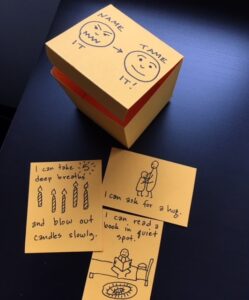When you think about making sure your young children are ready to be successful in school, do you immediately think of playing? We often forget the importance of “just playing” for children’s development, probably because it’s something that kids do naturally. It’s also easy to think that doing well in school is all about academics, but hidden underneath the ability to be successful academically are the abilities to sit still, pay attention, wait for a turn, ignore distractions, and learn from academic instruction.
Why not pair children’s natural inclination for playing games with practicing the crucial self-control skills needed for successful learning in the classroom?
You can sneak in opportunities for practicing self-control into everyday activities like following a cooking recipe, and playing boardgames. These structured activities help children develop skills like organizing and planning when following a recipe, finding the kitchen utensils and ingredients and adding them in the correct order, using working memory to hold the rules of the boardgame in their head, waiting to take turns, and paying attention to engage in the steps to achieve their goal. Here are some other ideas for games that encourage development of children’s self-control and regulation abilities.
Simon Says – You probably played this game as a child. Kids need to use their attention and active listening skills to only follow the directions when “Simon” says, and to stop themselves from doing the direction when it does not start with “Simon says…” This is a great game for kids to practice controlling their actions and paying close attention.
Can you Remember? – A game to practice following multi-step directions in a sequence. Ask the players if they can remember: “when I say ’go’: first, touch your nose, second, stick your tongue out, third, turn around in a circle… ready, go!” Start with 2-3 simple directions at first as this can be a real challenge for young minds and their working memory!
Red Light, Green Light – In another familiar game from childhood, the person acting as “stop light” gives the direction of “green light” to allow the players to move forward and “red light” to stop moving. The goal is to be the first person to reach the “stop light”. Another good game to practice attention and inhibitory control to stop oneself.
- Take this activity up a notch and making it Animal Red Light, Green Light. Add an animal when you say “green light”, e.g. “green light, move like a bunny” and the players have to move like that animal.
- Another adaptation is to make the movement opposite to the color, so players have to move on red light, but stop on green light. Similarly, you could change the colors, purple means go and orange means stop.
Freeze Dance – Kind of like musical chairs but without the chairs. Start the music and players get to dance to their hearts’ content… but as soon as the music stops they have to freeze like statues! This is a surprisingly simple activity that kids really enjoy and it can be a great brain break, or a celebration to get the wiggles out after working hard.
Wiggle, Giggle, Jiggle – This is a great active listening and behavioral control game. Players have to listen for the word “Wiggle” and when they hear it, they get to wiggle and giggle and jiggle. The caller leading the game says different words that sound like “wiggle” first like, welcome, watermelon, wink, winter, witch… wiggle! This fun way to get the wiggles out can be played over and over.
- “When I say go…” is another variation that you can use anywhere, like the grocery store, the park, or at home. “When I say ‘go’ you’re going to walk to the car like an astronaut in outer space, ready?… Gopher! … Golfball! … Goodyear… Go!”
Purposely practice waiting – Talk with your kids about the importance of waiting, and find situations to practice being patient: when you’re in line at the grocery store, or post office, or a time when they have to wait for you to be done with something. Just telling a young child to “be patient” or “wait” is hard for them, so give them some help. Ask them what they could do to make it easier to be patient and wait, and help them think of ideas:
- Could they look around and play an “I spy” game with themselves? Try to find every color of the rainbow by looking around, or find a number of things that are their favorite color, or the color of their shirt–“See if you can stay where you are, but look around and find 10 things that are the color red like your shirt.”
- Or if they are good with their letter sounds or have your help, can they find things that start with every letter of the alphabet? A for anthill, B for bicycle, C for cardboard, etc. Or find 3 things that begin with the same letter.
- Or if you can see lots of cars where you’re waiting, you can play the license plate game, and try to find the alphabet in license plates, or road signs.
Kids don’t just “have” self-control; it’s a skill they need time to practice. And practice is so much easier when you hide it in play! There are so many games and play activities that are natural self-control practice opportunities. And it’s such a bonus that play is a crucial part of children’s development that sets them up to be successful in school!
[divider type=”standard” text=”Go to top” full_width=”no” width=”1/1″ el_position=”first last”]
Text: © Kids In Transition to School 2022
Image: © Oksun70 | Dreamstime.com





